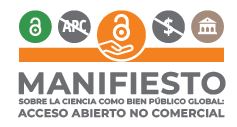Didactic model for the training of teachers who work with the Automation Curricular Unit
DOI:
https://doi.org/10.5281/zenodo.13975759Keywords:
Didactics, teaching model, teacher trainingAbstract
The purpose of the study was to generate a didactic model for the university teacher training that work with the automatism curricular unit, hence the fundamental purposes were to promote work to sensitize the social actors intervening, generate through reflection the influence of the use of the use of The didactic tools added to the cognitive aspects, and relating them to the creation of a model that allows to reflect a didactic strategy to be used in university education, to promote training actions aimed at intervening social actors, it sought to contribute to improve teaching dares of the educational practice with which a theoretical-methodological construct was generated. The analysis units are included by six teachers of the IUSF. Observation, interview, rain of ideas, bibliographic review and theory based for data analysis were used as instruments.
Downloads
References
Cabero, Julio (2008). Aportaciones al e-learning: desde la Investigación Educativa. España: Grupo de Investigación Didáctica. Universidad de Sevilla
Daros William (1983). Epistemología y didáctica. Universidad del centro educativo Latinoamericano Argentina, edición digitalizada. Rosario 2010.
Díaz Barriga, Frida Hernández R. Arceo G. (2010) Estrategias docentes para un aprendizaje significativo una interpretación constructivista. Editorial – McGraw-Hill, México.
Florez, Rafael (1999). Evaluación Pedagógica y Cognición. Bogotá, Editorial Mc Graw Hill Internacional.
Goetz, Judith y LeCompte, Margaret (1998). Etnografía y diseño cualitativo en investigación educativa. Morata, SA. Madrid.
Hidalgo, L. y De la Paz Silva, M. (2003). Hacia una evaluación participativa y constructiva. Primera Edición. Caracas. Editorial Panapo de Venezuela
Martínez, H. (2007). La investigación en la práctica educativa: Guía metodológica de investigación para el diagnóstico y evaluación en los centros docentes. Madrid: CIDE
Maxwell, Joseph. (1996). Qualitative research design: an interactive approach. Sage Publications, 1996. Páginas 1-13. Traducción de María Luisa Graffigna. 1. Un modelo para el diseño de investigación cualitativo.
Medina, A. (2003). La Didáctica: disciplina pedagógica aplicada. En Díaz Barriga, Frida Hernández y Arceo G. (2010) Estrategias Docentes Para Un Aprendizaje Significativo Una interpretación constructivista. Editorial – McGraw-Hill, México.
Quispe F. (2010). Estrategias para la práctica reflexiva. Pontificia Universidad Católica del Perú.
Ruiz Ortega, Francisco (2009). Modelos didácticos para la enseñanza de las Ciencias Naturales. Latinoamericana de Estudios Educativos, 3(2), 41–60. https://revistasojs.ucaldas.edu.co/index.php/latinoamericana/article/view/5764
Strauss, Anselm y Corbin, Juliet. (2002). Bases de la investigación cualitativa. Técnicas y procedimientos para desarrollar la teoría fundamentada. Universidad de Antioquía, Colombia.
Thompson Arthur, Strickland Alonzo (2012). Crafting and Executing Strategy: The Quest for Competitive Advantage: Concepts and Cases. Traducción: La elaboración y ejecución de la estrategia: La búsqueda de la ventaja competitiva: Conceptos y Casos.
Tobón, Sergio. (2009). Competencia docente en educación superior. Editorial Ecco. Bogota.
Vargas, Luis., y Rondón, L. Luis (2012). El enfoque socio crítico en la formación docente en la UPEL-IPB. Revista Educare, 16 (2), 176-190. http://es.slideshare.net/aliriotua/el-enfoque-socio-crtico-en-la-formacin-docente
Zarzar, Ch. (2010). Instrumentación didáctica por competencia. Instituto Didaxis de estudio superiores. Grupo Editorial Patria, ISBN, 607744555X. México.
Published
How to Cite
Issue
Section
License
Copyright (c) 2024 Universidad Alonso de Ojeda

This work is licensed under a Creative Commons Attribution-NonCommercial-ShareAlike 4.0 International License.
All content of Ethos Journal will be free access, distributed under the Creative Commons license (BY-NC-SA).




